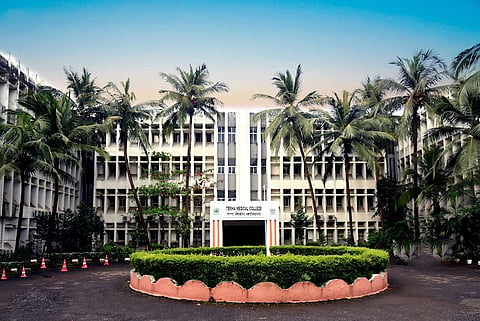
- Home
- Career Counseling
- Bharat
- Editorials
- Research
- Religion and Culture
- Corporate (Business News )
- State News Update
- Crimes News
- Education News
- Property News
- mocktest
- Life Style

Navi Mumbai, India – Terna Medical College, a private institution located in Nerul, Navi Mumbai, is under fire for allegedly charging students excessive fees in the form of hostel deposits and caution money, in direct contravention of the state Fee Regulating Authority's (FRA) recent directives.
The controversy erupted after several candidates who secured seats at Terna Medical College reported that the institution demanded a sum of ₹1.7 lakh as hostel deposit and caution money. This demand was made despite the FRA's recent decision to cap the total refundable deposit amount for medical courses at ₹50,000. The FRA's ruling was aimed at making education more accessible and reducing the financial burden on students and their families. However, the college's refusal to adhere to these regulations has left students and parents outraged.
One of the major concerns raised by students is the compulsory enrollment in the college's hostel, even for those who live nearby and would prefer to commute from home. This policy not only adds to the financial strain but also raises questions about the college's motivations.
Adding to the students' grievances, female candidates allege that the college is obstructing their ability to avail of the state government's newly introduced fee waiver scheme for women pursuing professional courses. According to these students, the college is demanding that they sign an undertaking agreeing to pay the entire fee amount unless the institution receives the government reimbursement for the fee waiver by December. This requirement puts students in a difficult position, forcing them to choose between financial security and their right to education.
The FRA's recent directive was clear in its intent to protect students from exorbitant fees under various guises. The authority not only set a ceiling on the deposit money but also explicitly prohibited institutions from demanding such fees at the time of admission. The directive was welcomed as a much-needed reform in the educational sector, aimed at promoting transparency and fairness.
Terna Medical College's alleged defiance of this directive has raised concerns about the enforcement of FRA's regulations and the accountability of educational institutions. The situation has prompted calls for a thorough investigation into the college's practices and appropriate action to ensure compliance with state regulations.
Students and their families are understandably distressed by these developments. "We were relieved when the FRA announced the cap on deposit fees. It seemed like a step in the right direction. But now, facing these demands from the college, we feel betrayed," said one parent, who wished to remain anonymous.
The financial burden of the deposit, coupled with the uncertainty surrounding the fee waiver scheme, has left many students questioning their decision to enroll at Terna Medical College. "It's not just about the money; it's about the principles. If an institution doesn't follow the rules, how can we trust it with our education?" a student remarked.
The allegations against Terna Medical College have sparked a broader debate about the regulation of private educational institutions in India. Many are calling for stricter enforcement of FRA's regulations and greater transparency in the financial dealings of such colleges. There is also a growing demand for the state government to intervene and protect the rights of students, ensuring that they are not exploited under the pretext of education.
As the situation unfolds, all eyes will be on the FRA and the state government to see how they respond to these serious allegations. Students and parents alike hope for swift action that will not only address the issues at Terna Medical College but also set a precedent for other institutions to follow.
The case of Terna Medical College highlights the ongoing challenges in the Indian educational system, particularly in the regulation of private institutions. As students continue to seek justice, it is imperative that regulatory bodies and the government uphold the principles of fairness and transparency, ensuring that education remains a right, not a privilege.
Source : free press journal
The mainstream media establishment doesn’t want us to survive, but you can help us continue running the show by making a voluntary contribution. Please pay an amount you are comfortable with; an amount you believe is the fair price for the content you have consumed to date.
happy to Help 9920654232@upi
